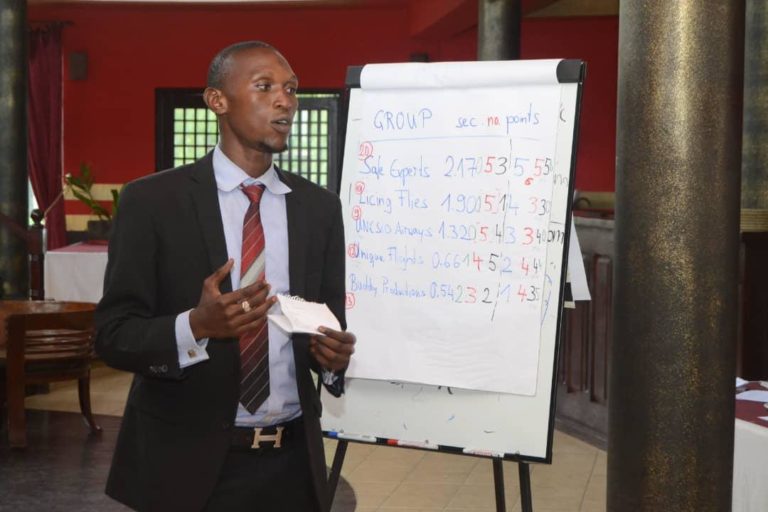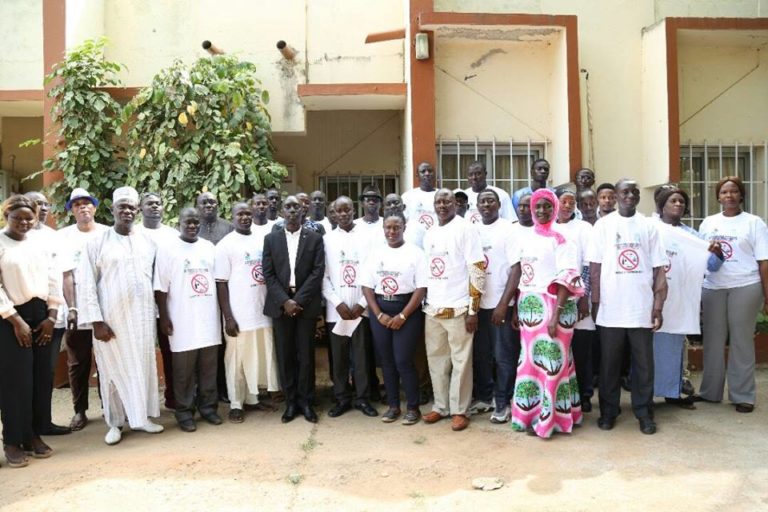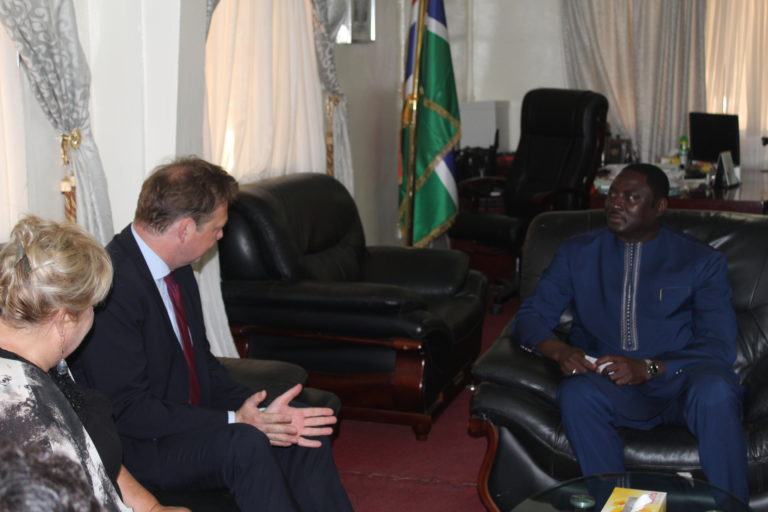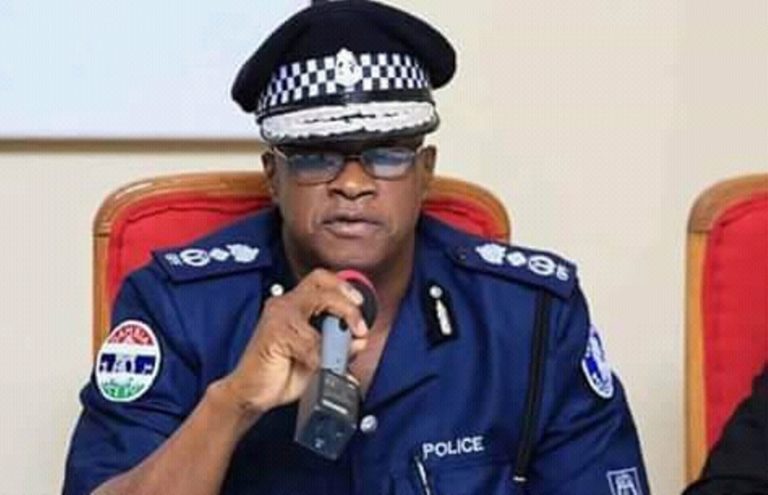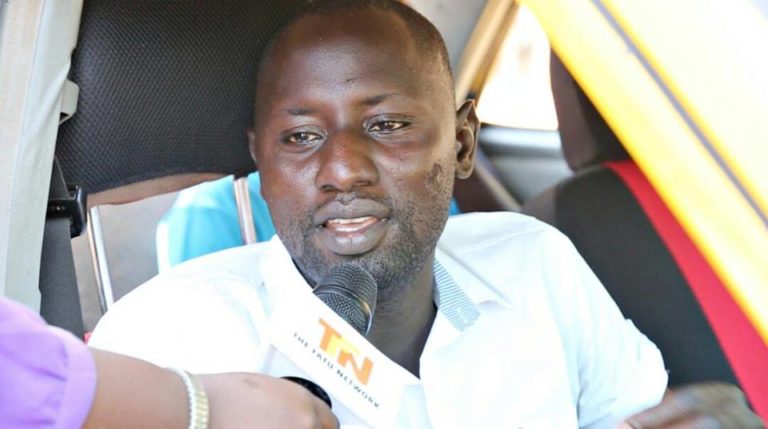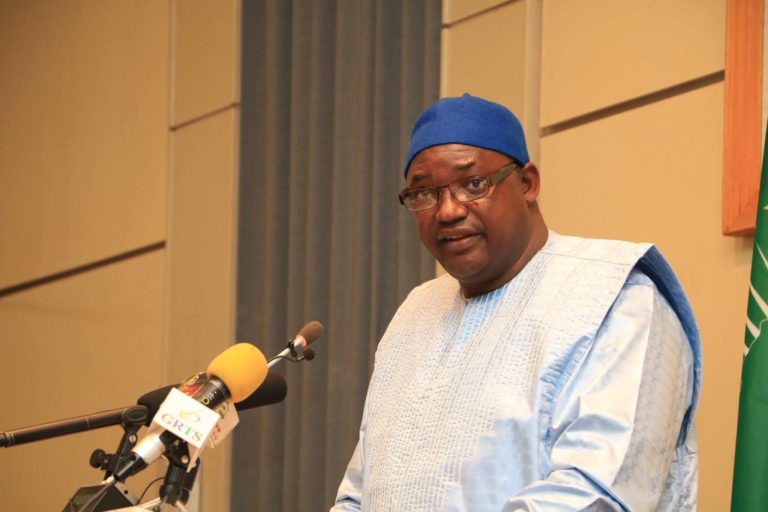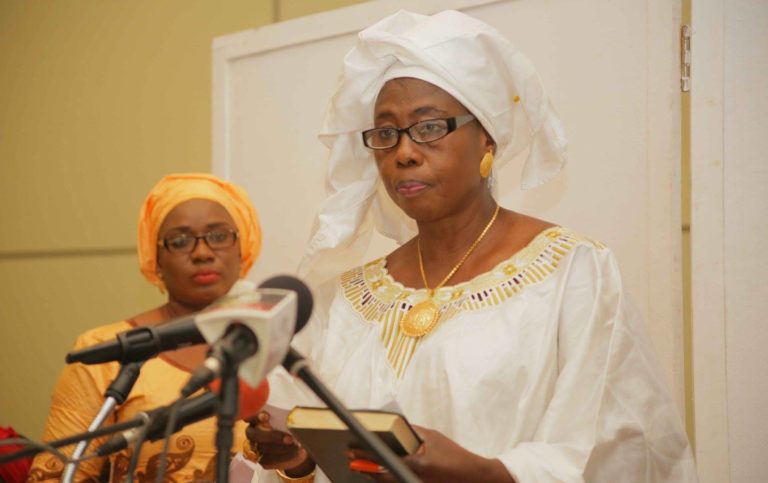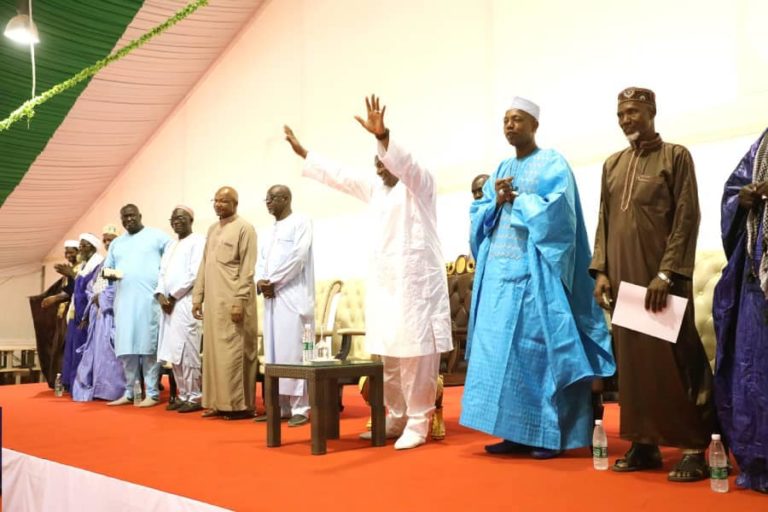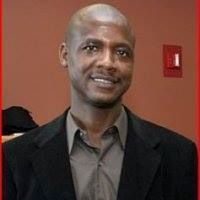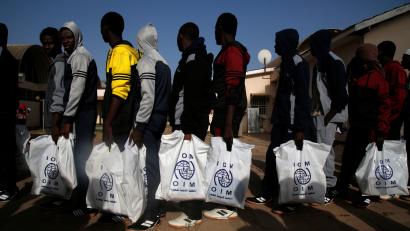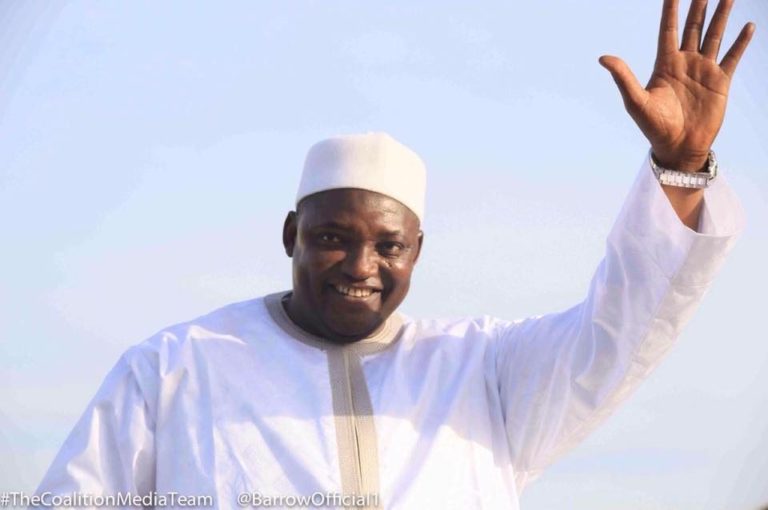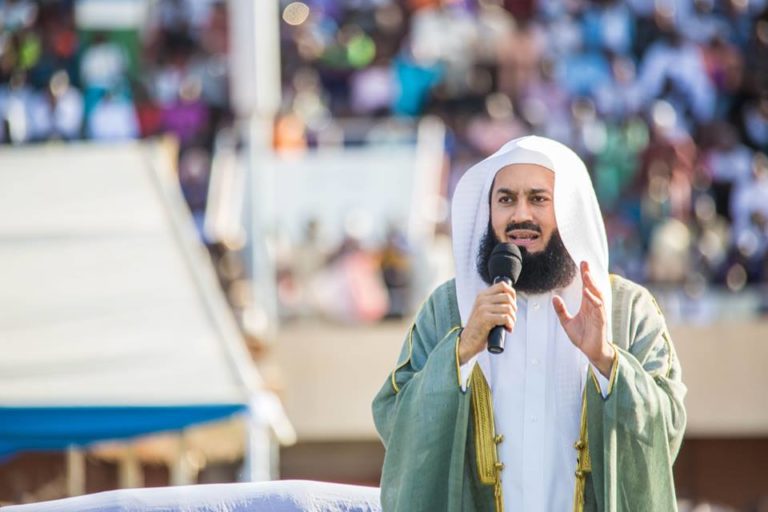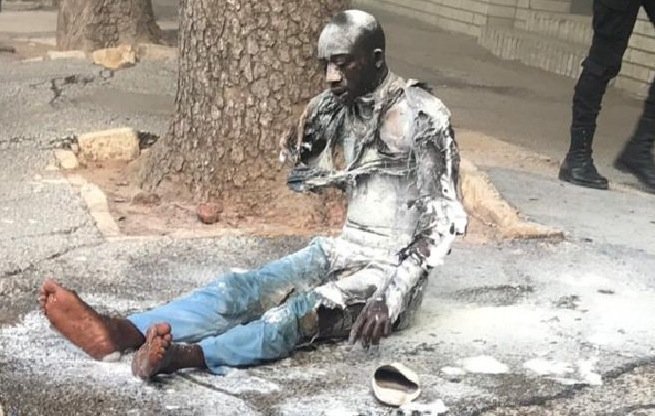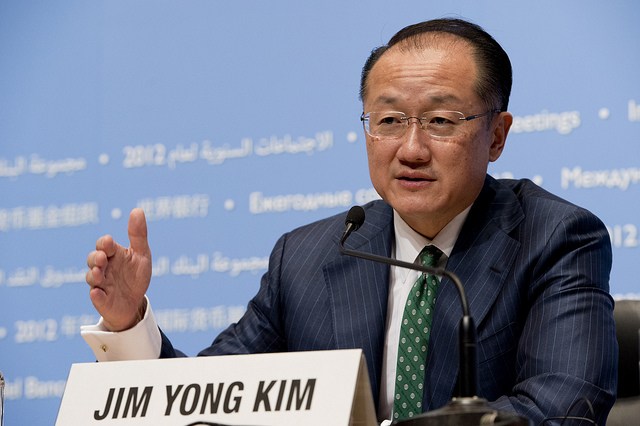Students Urged to Stand by Embattled Fatou Jawo
By Mamud Kifa
Students of the University of The Gambia have been urged to stand up for their colleague Fatou Jawo who continues to come under increased attention over her recent marriage ruckus.
Fatou Jawo was last week asked by an Islamic court to return money given to her by her husband, Sheikh Ahmat Ceesay.
The court had held in an unprecedented ruling that Fatou swindled Ceesay as the latter courted her.
But the University Economics and Management Students’ Association is calling on students to stand by Fatou.
ECOMANSA president Ebrima L Dampha speaking on the social media messaging system WhatsApp appealed to students to refrain from sharing audios and images of Fatou Jawo and Sheikh on any media platform.
“There are a lot of complications surrounding this issue and I believe even if Fatou Jawo is wrong, we should not be a party to worsen the situation by publishing it in different social media outlets…the least we could do is sympathize with her, but rolling unpleasant and sentimental words on her is something we should desist from,” he said.
Dampha commended the students of the University especially School of Business and Public Administration for the support they have shown to Fatou.
He said he expects students to create a conducive environment for Fatou and stand by her during what looks like a breaking point in her life.
“This is a personal issue and everyone should respect her privacy,” he asserted.
Dampha said this can happen to anyone and this is life and we should all learn from it. As university students, we should continue using social media platforms to enhance our academic skills and to help improve and play our quarter in national development.
“The last thing I will do as her President is to join the crusade of painting her integrity,” Dampha concluded.
Group to Support Gambia’s Drugs Fight
By Mammy Saidykhan
The Chairperson of Journalists against Illicit Drugs Trafficking and Organized Crime, JAIDTOC, has said that the involvement of the media in the fight against drugs could help the country address its illicit drugs challenge.
Modou Kanteh stated this on Tuesday at the official launch of the group which seeks to partner with the Drug Law Enforcement Agency of The Gambia to combat illicit drugs and organized crime.
“The involvement of the media in the fight against illicit drugs trafficking is important. This is simply because journalists are the movers and shakers of society,” Kanteh said at TANGO where the event was held.
According to him, if The Gambia as a country is to be successful in the fight against illicit drug trafficking and substance abuse, the media needs to be seen as a major stakeholder.
Kanteh stated that if the media continues to report on the dangers of illicit drugs trafficking and organised crime, there will be some level of significance and attention by the public.
“If the media continually report issues of illicit drugs such issues would no doubt help shape how the public perceives and interprets drugs related issues in our communities,” he added.
The Director General of the Drug Law Enforcement Agency of The Gambia, DLEAG, Bakary Gassama, dilated on the negative impacts of drugs saying “many lives have been lost; women widowed; children orphaned; families separated; careers destroyed; prospect and potential of bright youths destroyed.”
Gassama applauded the initiative and assured of his office’s commitment to work with media.
“We must therefore join hands in combating those trading in these illicit substances in our communities,” he said.
He added: “Let us work together, let us spread the message about the dangers associated with drug trafficking and abuse… The more we talk about it in our radio programs, social media platforms, televisions and newspapers it will create more awareness and help people make positive choices.”
Gambia Covets Closer Ties with Germany
The Minister of Foreign Affairs, International Cooperation and Gambians Abroad, Dr Mamadou Tangara, on Monday 5th November 2018 met with Dr Philipp Ackermann, Director General for Africa, Latin America, Near and Middle East of the German Ministry of Foreign Affairs.
Dr Philipp Ackermann was accompanied to the Ministry of Foreign Affairs by Anita Martin, Head of the Liaison Office for The Gambia of the Embassy of the Federal Republic of Germany in Dakar and Thomas Wixler, Deputy Head of Mission of the Embassy of the Federal Republic of Germany in Dakar, Senegal.
In a brief interaction at the Foreign Minister’s office in Banjul, Dr Philipp Ackermann said the purpose of his visit was to take stock of the activities of the Federal Republic of Germany in connection with bilateral relations with The Gambia.
He said The Gambia has been a good partner of Germany and expressed hope of a stronger cooperation in the future.
For his part, Foreign Minister Tangara thanked Dr Ackermann for the visit, adding that The Gambia looks forward to strengthening bilateral relations with German.
On the question of The Gambia’s relations with neighbouring Senegal, Foreign Minister Tangara said the two countries are much closer than ever before. He said the two peoples have remained historically close.
The Permanent Secretary II of the Ministry of Foreign Affairs, Mr Sulayman Njie and Mrs Salimatou Jallow from the European Affairs Division of the Ministry of Foreign Affairs were also in attendance.
Police Deny Killa Ace’s Brutality Allegations
The Gambia Police Force has denied allegations of brutality made against the force by popular rapper Killa Ace.
Killa Ace in a written tell-all last week said he was brutalized by six men of the police Anti-Crime Unit.
The alleged torture is said to have taken place in Serrekunda.
But police said in a statement on Monday that “Ali Cham’s claim of being tortured by the police is unfounded for everything that transpired was according to due process of the law.”
“It is a wide known fact that the section of the Serekunda market known as ‘Black Market’ is mainly the place where thieves, burglars, robbers, etc, usually dispose properties stolen from victims of crime. For these reasons, operatives of the Gambia Police Force usually monitor and conduct surveillance to track down stolen properties linked to reports and complaints,” the statement said.
According to the police, on Monday the 29th October 2018 around mid-night the police conducted a routine ‘stop and search’ operation at the ‘Black Market’ and individuals who couldn’t give proper account of valuables in their possession were taken in for further questioning.
“Ali Cham alias Killa Ace, was found at the ‘Black Market’ during such odd hours of the night. He was found with a bag containing suspected stolen properties. He requested for the identity of officers which was done straightaway but he refused to be searched and further went on insulting officers while posing serious physical resistance and to top it all he assaulted a uniformed officer and tore apart both his uniform shirt and trouser,” the statement added.
Drivers Complain As Gasoil Sells for D60
By Mammy Saidykhan
Motorists in the Greater Banjul Area on Monday complained about the continued rise in the price of fuel in the country.
The motorists mostly taxi drivers bemoaned the situation, saying it was making some of them wind down on their business.
Mam Baye Bittaye, a taxi driver tells TFN on Monday that the continued rise in the price of fuel was causing them pain.
“It’s really a difficult time for us if you look at how much we buy a litre of gasoil. The price of fuel rises every two weeks while fares have remained where they are,” he said.
Bittaye explained that drivers who work for passenger vehicle businessmen are now having issues with their bosses due to the fact that “what you’re suppose to bring to your boss at end of the day, you can’t have it anymore.”
According to him, taxi business is now not as lucrative as it should be which has led to some wanting to sell off their taxis.
“A taxi is supposed to make D500 daily… So we go to work and find it difficult to make D1000. If you buy fuel for D900, it often becomes impossible to make D1000. So sometimes you go home without profit,” he said.
Another driver Yayha Saidykhan said that the rise in the price of fuel has affected them seriously as they have not been making any profit in recent times.
“The increment has come off as a difficult for us because if we buy a litre of fuel at D60 and if you want to have the fares at D8 you realize that there is no profit due to the increment,” he said.
He added that drivers who are hired to make an amount of D500 on a daily basis encounter challenges to get that amount and also buy fuel.
“This is the reason why most taxi drivers including myself have stopped going on D8 trips,” he said.
Saidykhan appealed to the government to reduce the price of fuel.”
“If truly the government cannot reduce the price of fuel, they should try increase fares by at least D1 or D2,” he said.
He added that this will make life easier for both commuters and drivers.
On his part, Dan Drammeh said he earns a living through driving but the increment has affected him.
“All of us have families who depend on us. It’s difficult, and we have no choice but to bear with the situation,” he said.
Dan urged the government to intervene saying “the government should help us in this situation and reduce the fuel price.”
Barrow Calls for More Gambian Investment in Tourism
By State House Media
President Adama Barrow has highlighted the government’s policy to encourage more Gambian involvement in the tourism sector in a bid to ensure more benefit for ordinary Gambians.
According to him, more Gambian investment in the industry would be in line with the government’s plans to limit capital flight, boost more Gambian involvement at the highest levels, and foster of a strong linkage between tourism and other domestic sectors of the Gambian economy, such as agriculture, businesses, arts, culture, among others.
The president made the disclosure during an unannounced visit to four Gambian-owned hotels in the Tourism Development Area to inspect the state of work and preparations.
The hotels visited are Metzy Residence Hotel, Pamala, African Princess, and Calabash Residence. He was received by the Minister of Tourism and Culture, Hon. Hamat NK Bah, and the Environment Minister, Lamin Dibba and officials from The Gambia Tourism Board. The tourism season already started three weeks ago, with several flights from the UK, Europe, and Russia.
The President also revealed that the government is aggressively pursuing plans to raise the tourism sector’s contribution to the Gross Domestic Product of The Gambia from 20%.
“Tourism makes 20 percent contribution to our GDP. It is a great source of foreign exchange for our economy and creates thousands of jobs for the youth,” President Barrow said, stressing that the revenue generated from the sector, when retained, would be able to benefit ordinary Gambians.
Works at three of the four hotels were at an advanced stage of construction. One of them, Metzy Residence Hotel, owned by Mr. Musa Secka, is billed to be inaugurated next month. Three others are expected to begin operations early next year.
“Our strategy is to have 1,000 Gambians working for us. At the opening, we will employ 300 Gambians,” explained Malleh Sallah, Chief Executive of the 140-room Pamala Hotel – a four-star hotel that is part of the Djeliba Leisure Group.
Mr. Sallah, while taking the delegation on tour of the hotel and its facilities, explained that they hire some Gambian hotel professionals from abroad to come work for them. The furniture is exclusively made in The Gambia, using top class wood to make the highest standards for the hotel.
Similar tours were conducted at Calabash Residence, owned by another Gambian entrepreneur, Aziz Khan; the African Princess Hotel, a 141-room four-star hotel, rendering five-star services, also owned by a Gambian businessman, Freddy Blain.
Minister of Tourism, Hamat Bah, explained that the objective of the government is to support and promote Gambian ownership in the industry. According to him, the ones visited would provide top class services, expressing optimism that their presence would add a great value to the industry.
In terms of job creation and standardization, he said The Gambia Tourism and Hospitality Institute are also undergoing reforms of both structures, curriculum, and services to train and professionalize workers for the industry.
The tour culminated into a beach cleaning exercise aimed at raising awareness and encourage more cleanliness on the country’s pristine beaches in the protection of marine resources in our ecosystem.
Abiding Word Marks 30 Years of Existence
Abiding Word Ministries The Gambia on Monday began celebrating how far they have come since the church was set up 30 years ago.
AWM is an indigenous and nationalistic full gospel church established in November 1988, to “bring purpose, direction and joy to believers by provoking them into maximizing their God-given potential in skill development, productivity, self-sufficiency, and confidence in God.”
“Abiding Word Ministries (AWM Gambia) is OFFICIALLY 30 YEARS TODAY! What began on Sunday 5th November 1988, in an inaugural morning service with 7 people in a 5×5 metres YMCA classroom, now 30 years (3 DECADES) later,” a statement from the church said.
According to the church, their mission is to restore mankind to god-consciousness and christ-like service.
“We thank & give the glory to god for all the testimonies and the national recognition. It is only god, who alone can do this; he has more than sustained us, and has sent this vision global,” the church said.
Sandu Lawmaker Survives Car Accident
The national assembly member for Sandu, Mahamadou Mahanera, on Sunday suffered minor injuries when his car somersaulted near Diabugu.
The Fatu Network understands Mr Mahanera was travelling back to Banjul from his home village of Diabugu when the accident occurred.
The young National Reconciliation Party lawmaker had travelled to Diabugu on a peacemaking mission.
The mission was in respect of growing tension between the different classes of the Serahule tribe in Diabugu, a source said.
Mr Mahanera was in the vehicle with at least three other passengers when the accident occurred.
Meanwhile the Sandu lawmaker has said in a Standard newspaper report on Monday that his car overturned when he tried to avoid a pothole.
Gambia Gets Equipment to Fight Cancer
Minister of Health and Social Welfare has said that the government has acquired a number of machines to fight cancer.
““The government of Adama Barrow is looking into this [equipment] issue and I want to tell you chemotherapy machines available. It’s on the way coming,” Dr Isatou Touray speaking at a cancer awareness rally in Banjul on Sunday said.
The civil society group African Women Against Cancer Association in partnership with Fighting Against Cancer in Africa held a cancer awareness rally at the McCarthy Square on Sunday to raise awareness of the disease.
And according to the health minister, the new machines when installed are expected to enable Gambian hospitals attend to more cancer patients in the country.
Breast cancer affects women mostly and Sunday’s rally saw women groups from across the length and breadth of the country mass together.
Dr Touray said: “What you’re asking is your right. Health is your right. It’s a right that you should have. Ministry of health is ready to partner and work with you since this is important to us. The role of civil society is very key in effective change.”
She added: “People who have the knowledge about this disease should create awareness so that people know more about the disease. Do not hide it since cancer is not a disease that is transmissible. Time has come for us to sit and discuss about the disease so people can become more aware and be going to hospital.”
Over 800 URR Youth, Women Meet Barrow
At least 800 people mostly youth and women from Upper River Region on Sunday met President Adama Barrow at State House where they resolved to support his change agenda.
“A delegation of over 800, comprising youth, women, religious leaders, and elders of the Upper River Region of the Gambia, drawn from its 7 constituencies were at the State House today to pay a courtesy call. They were at the Presidency to renew support and commitment to my government’s development agenda, and discuss pertinent issues of interest in the region,” President Barrow said in a Facebook message Sunday.
According to the President, development projects like roads, bridges, electricity, access to farm implements and marketing of agricultural goods, support to Islamic education featured prominently among the subjects of discussion at the meeting.
“Receiving influential and opinion leaders from across the region I hailed from was a beautiful and historical gathering,” the President said in the post.
Urging Govt to Immortalize Democracy Heroes and Proclaim December 1 Democracy Day
By Alagie Yero Jallow
It is now crystal clear that the coalition leadership took their eyes off the ball. In their state of euphoria after achieving an unprecedented electoral victory, the leadership failed to appreciate that managing success is even more taxing than winning an election. They vacillated when they ought to have acted with promptness. Some of them have sought to falsely consign the verdict of the December 1, 2016, historic day to irrelevance. They have lived in denial for so long. December 1 Presidential elections challenges Gambians to guard their democracy. As they remember December 1, they are challenged to guard their hard-won democratic freedom and prevent any hijack or abuse of the very principles of constitutional democracy.
December 1 stands as the real democracy day which was sanctioned by the blood of martyrs who laid down their lives for this democracy. They know that even as enemies of democracy try to thwart the idea, the sacrifice of Gambians who took to the streets should never be forgotten. The onus is on the Government to immortalize the true heroes of the Gambia’s democracy. This day December 1 must be a national day and be declared a national holiday. The State should further champion the course of deepening this nascent democracy, by ensuring that living and dead heroes of December 1 struggle to ensure that they are not forgotten.
The people of the Gambia should honor and remember the heroes and heroines of the country’s democracy and to commemorate the death of the late pro-democracy activists. Since December 1 stands as one of the most significant dates in the Gambia ’s political history, and a day not to be forgotten. One of the best national recognition the struggle deserves.
Nation building requires the sacrifice of all citizens: all and sundry must therefore imbibe the moral rectitude to embrace the past. They must, therefore, recognize the heroes and heroines of Gambia’s democracy. December 1, events in Gambia’s history symbolizes strong democratic principles and experience. President Adama Barrow and his government must place history in the right perspective by recognizing and declaring December 1 as a Democracy Day. Adama Barrow should recognize its key figures that entrenches the Gambia’s democratic experience for the past 2 years in furthering the cause of democracy and good governance.
Several Gambians were in the forefront and an active participant in the politics of the dictatorship era. They shared the fears, pains, and anxieties of fellow Gambians about the horrors of dictatorship; their efforts at building an enduring democracy have not always been smooth. President Adama Barrow and his government has to halt the deceit, and repair the damage by taking the symbolic step of recognizing the sacrifices of pro-democracy activists and many other heroes and heroines of democracy-the artisans, human rights organization, students, traders, journalists, academics, various professionals, organized religion and the labor movement through conferment of the National award with full honors, an honor first to men and women, young and old who paid the supreme price to pave the way for Gambia’s democracy, and then to the heroes and heroines who stood up against dictatorship, including those in the Fourth Estate of the realm who marshalled the written and spoken words against tyranny and the proclamation of December 1 as Democracy Day.
The Gambia government should also give the posthumous award to the families of all fallen heroes and heroines the Gambia’s highest honor. This action is not to open old wounds, but to put light on the nation. They cannot right the past, but they can at least assuage their feelings and will no longer tolerate such perversion of justice, corruption and human rights violations. December 1 was the day Gambians has decided to end dictatorship, chose the path to national unity, rather than ethnic eyes. They redefined the Gambia through the ballot box. It is possible to revive the spirit of December 1 provided they could imbibe democratic principles.
No Gambian can doubt the United Gambians of all tribes, social media activists, Facebook warriors and all for the good interest of the Gambia and their great people. Don’t underestimate their prowess to change bad government of the Gambia, determination and pledge for a better Gambia. They were great men and women, great enough to give frame to change towards a better future for all Gambians, currently in their history. They are the guidance of their nation and people.
They are there when an educated and wealthy class despised the Gambia and their people because they have robbed the Gambia of their treasures, or, at least, have got rich off the fruits of their people’s labor and they believe that if poor Gambians get freedom from corruption their fountain will be dried up and they will be obligated to seek business in a new channel with failure.
You do not remove a ruthless dictator by only carrying placards. You don’t do that at the Elysee Palace, they will listen to you. You do that at the Buckingham Palace, they will listen to you. You do that at the White House, they will listen to you. as the arrowhead of the struggle against a brutal dictator.
Lastly, the government and civil society organizations should propose a hall-of-shame for past Gambian leaders and enablers of dictatorship who were infamous for their brutality to sound as a warning note to would-be bad leaders.
Association Says 30 Gambians Died in Italy in 2018
An association of Gambians in the northern Italian city of Milan has said that 30 Gambians lost their lives in Italy in 2018.
The association’s secretary Sitta Darboe disclosed this during a meeting with the National Assembly Member for Banjul North, Ousman Sillah.
Mr Sillah who is on a seven-nation tour of Europe on Saturday November 3 met about 30 Gambians and their Italian friends at Cascina Casottello, Via Fabio Massimo 19, in Milan, to discuss pertinent issues among them their welfare.
In his introduction of Mr. Sillah, Mr. Sheikh Njie, the Chair of the event, explained the Banjul North NAM’s political background, the work he is doing and the responsibilities he assumes at the level of the National Assembly.
Welcoming remarks were also delivered by the President and Secretary of the Association of Gambians in Milano, Messrs. Kebba Dem and Sita Darboe, who both spoke at length about the history, work, issues and challenges of their organisation.
Mr. Dem called on Gambians in Italy to come and join their association.
As for Mr. Darboe, he disclosed that just for this year (2018) 30 young Gambians lost their lives in Italy and that 28 of the corpses have been returned while the other are yet to be flown back to the Gambia.
One of the two dead bodies that are still in Italy is a murder case of stabbing if a Gambian by another Gambian youth which is now before the court.
Mr. Darboe also highlighted the challenges that Gambians face and the efforts being made by their association in addressing them. He called for support from the Gambian government to open other consulates in Italy.
Addressing the gathering, Mr Sillah thanked all those present for responding to the invitation as well as Mr. Njie for facilitating the meeting.
The Banjul North explained the four key statutory roles of a National Assembly Member; making laws, providing oversight, representing the electorate and advocating for issues that concern the people.
He explained that his mission in Europe is in line with discharging his representative and advocacy roles by meeting with Gambians in other to understand their issues for better representation and articulation of their concerns.
Mr. Sillah told the gathering about the non-statutory initiatives he has undertaken at the level of his constituency such as the scholarship fund for students in secondary school which he is supporting from his salary and also the technical and vocational education training for the out-school, unemployed, potential and returning migrants i.e. Crab Island Initiative.
He noted that political representation is all about being relevant to lives of people by knowing and addressing their problems. This, he added requires sacrifice, honesty, humility, knowledge and commitment. He further stressed that political representation is not a means for personal enrichment, privilege and power but selfless service.
The Banjul North lawmaker told them that he is there to listen to them so that he will go back to share their issues with the National Assembly, the Executive and the Gambian population in general for awareness raising and interventions.
Mr. Sillah was nearly emotional when he was recounting his experience regarding the pathetic and heart rending conditions in which he found the young Gambian undocumented migrants at the central train station in Milan.
The Banjul North NAM said the migration phenomenon is a matter of common concern and as such would require collaboration and solidarity between the countries of origin and host countries, involving governments, populations, civil society as well as International organisations.
He said migration is an age old phenomenon which has been existing since time immemorial, citing the case of Argentina, among others, where nearly half of the population is of Italian descent thanks to migration.
He stressed that European host countries and Italy have moral and legal obligations to accomidate and support the migrants. He said returning them through forced repatriation would not solve but aggravate the problem for all. He said the governments need to sit down and agree on establishing programmes in Europe that would help train these migrants to acquire skills and to be further assisted them to establish themselves in thriving enterprises.
Mr. Sillah noted that African governments also have a responsibility and duty to ensure that their countries resources are managed and invested in such a way that there will be incentives and opportunities for young people to stay at home. He added that this is the only effective and durable way that we can stem irregular migration.
The Banjul North representative urged the Gambian community in Italy to unite, irrespective of partisan, sectional or ethno-linguistic considerations, to be able to address both their collective and individual needs. He advised them to be supportive to one another, adding that individualism shall and will never pays.
Mr. Sillah said he is there to listen to them.
In the ensuing interventions, the participants made comments and asked wide ranging questions on issues that relate to them in Italy and the diaspora, in general, and also the Gambia in terms of the political, economic and social conditions.
The issues of enfranchising the diaspora to vote, Coalition MoU and the 3 years, commissions, the vehicles to parliamentarians, economic conditions, among many others, were raised and responded to by the visiting parliamentarian
In further responding to their questions, Mr. Sillah made it very clear that his mission to Europe is not at the behest of the Government of The Gambia and that he is not receiving any per diem for it.
It concluded with the participants and association expressing their profound gratitude to the Banjul North for the visit and the interest he has shown towards their welfare. They wish him a successful tour of Europe and a safe return home.
Barrow Leaves for Senegal Today
President Adama Barrow will today leave The Gambia for Senegal to attend the 5th Dakar International Forum on Peace and Security.
The forum will bring together Heads of State, government representatives, experts, and partners on peace and security, a statement by the presidency on Sunday said.
The theme of the forum is “Peace and Security in Africa: Stakes of Sustainable Stability and Development.”
“The two-day forum will discuss emerging security challenges and strategic issues in Africa, new approaches to defense, security and development policies as well as African partnership with relevant organisations on building peace and security in the region,” the statement said.
President Barrow will depart Banjul International Airport at 7:00 pm.
Gambia Needs Peace to Grow – Mufti Menk
By Lamin Njie
Respected Islamic scholar Mufti Menk on Saturday delivered a major lecture at the Independence Stadium in Bakau calling on all Gambians not to compromise the security that God has blessed them with.
“What we are seeing in the globe today is destruction because that’s what we are doing ourselves, with our own hands. We cannot tolerate the person we differ with. That’s why we are failing,” The Zimbabwe-born cleric told thousands of believers at the Islamic gathering dubbed, ‘Respecting the Differences.
“If you want gilt of your own nation here today – which is probably one of the richest countries in terms of resources – you need peace, you need stability, you need security. Otherwise you’re not going to grow. So I call on you never to compromise the security Allah has blessed you with in this nation of yours. No matter what don’t harm each other; don’t abuse each other; help each other; learn to respect each other.”
Lots of Islamophobes
Sheikh Ismail Mufti Menk who is visiting The Gambia for the first time in his lecture said there are a lot of people who view Muslims in bad light.
Menk said: “People look at us today and think that we are warmongers; we are extreme; we promote that which is violent. That’s not true. Here I’m in this beautiful platform telling you, ‘go home and resolve your problems’. Learn to forgive others. When you forgive others, you’ve actually helped yourself more than them.”
Man Sets Himself on Fire in Front of Senegal Presidency Complex
Police in Senegal are dealing with an incident after a man believed to be physically challenged set himself on fire on Friday.
The man whose identity wasn’t immediately revealed performed the act directly in front of the presidential complex of Senegal, a report by Senego says.
The motive for the suicide attempt is not unknown.
The extremely rare incident caused more fear than harm as passers-by were quick to rescue the man from himself by pouring water on him.
Firefighters have been drafted to the scene, local reports say.
This is a developing story………
Gambia Sluggish on World Bank’s Ease of Doing Business Ranking
By Alagi Yorro Jallow
The Gambia is ranked 146th among 190 economies in the ease of doing business, according to the latest World Bank annual ratings. The rank of the Gambia deteriorated to 146th in 2017 from 145th in 2016.The Ease of Doing Business in The Gambia averaged 145.80 from 2008 until 2017, reaching an all-time high of 150 in 2013 and a record low of 135 in 2008.
The Gambia has remained 146th spot on the latest World Bank Ease of Doing Business ranking. The bank released the report themed ‘Doing Business 2019: A Year of Record Reforms, Rising’. In the 2017 edition of the report, The Gambia rank deteriorated to 146th in 2017 from 145th in 2016. The World Bank said it tracked 314 reforms by 128 governments across the world.
“Governments have the enormous task of fostering an environment where entrepreneurs and small and medium enterprises can thrive,” said Jim Yong Kim, World Bank Group president.
“Sound and efficient business regulations are critical for entrepreneurship and a thriving private sector. Without them, we have no chance to end extreme poverty and boost shared prosperity around the world.” Said Jim Yong Kim.
According to the report, a total of 107 reforms were carried out in sub-Saharan Africa, a record for the region. The report did not specify any reforms undertaken by the government which include Starting a Business easier in the country covered by Doing Business in the Gambia.
The report mentioned that getting regular electricity, trading across borders and enforcing contracts, and issuing new rules of civil procedure for small claims courts appears negative. The report further revealed that property registration is less transparent by not publishing online fee schedule and list of documents necessary to transfer a property in the Gambia.
The Ease of doing business index ranks countries against each other based on how the regulatory environment is conducive to business operation stronger protections of property rights. Economies with a high rank (1 to 20) have simpler and more friendly regulations for businesses. Ease of Doing Business in Gambia – actual data, historical chart and calendar of releases – was last updated on November of 2018



